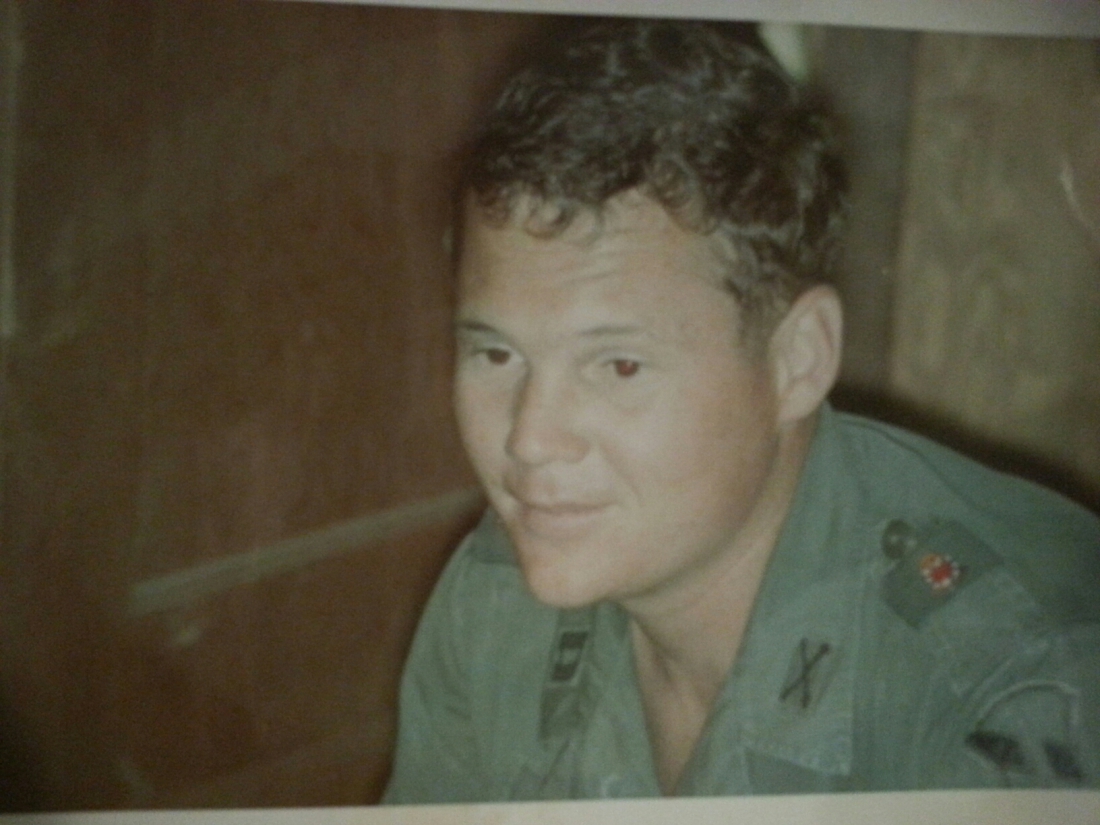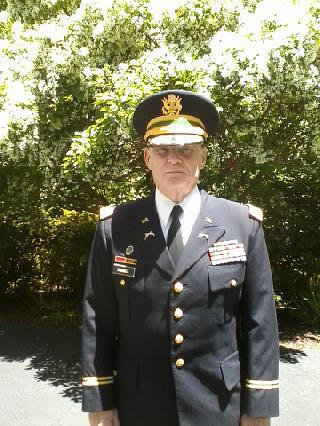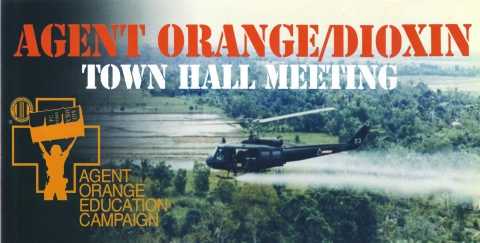Ted Minnick has been a military man all his life. You can see it in his disciplined posture, his purposeful gait, his even gaze. What you cannot see, however, are the wounds he suffered as a result of his service — not from gunfire or shrapnel, but from exposure to a deadly, now-infamous herbicide known as Agent Orange.
Minnick served as an artillery battery commander in Vietnam and now suffers from leukemia — one of many illnesses linked to exposure to the dioxin-based chemical. But during an Oct. 25 Agent Orange Town Hall held in Asheville, he spoke not for himself but for his daughter and the many other children of veterans who illnesses might be linked to what happened to him in Vietnam. Minnick addressed a room filled with other veterans and their families: “I don’t hold any grudge against the U.S. government,” he said. “What I hold is guilt for bringing it back.”
While his illness has been covered by the VA, Minnick’s had no success getting help for his youngest daughter, Sarah, who was diagnosed with Multiple Sclerosis in 1997. “I’m scared – I’m not mad,” Sarah said. “I want the government to realize that we need centers to do research to find where these conditions come from.”
Joining more than 400 Vietnam veterans and their families at the Enka Campus of A-B Tech, the Minnicks urged passage of the Toxic Research Act of 2014, which would, among other actions, call for researching the health effects caused by exposure to toxic substances like Agent Orange.
The Minnicks’ testimony was one of several presented at the town hall, hosted by Chapter 124 of the Vietnam Veterans of America. The meeting was part educational referendum and part town hall-style meeting. The day’s overarching purpose, however, was to demonstrate the generational effects of Agent-Orange exposure and to push for passage of legislation aimed at helping the people who bear that legacy.
As Spider Trantham, president of VVA Chapter 124, said, “We are fighting a silent enemy.”
The afternoon’s first speaker, Mokie Pratt Porter, talked about the generational impact of Agent Orange exposure. National director of communications for the VVA, Porter explained, “We needed to put a human face on the problem.” To that end, she showed videos of both Vietnam veterans and their children speaking about the illnesses they had experienced as a result of exposure to the dioxin-based chemical. Porter also talked about the Toxic Research Act, which would establish a research center and a board of advisors charged with determining what health effects are caused by Agent Orange, declassifying documents regarding Agent Orange usage and launching a national outreach and education campaign.
Following Porter was Jack McManus, a member of the Air Force who participated in Operation Ranch Hand — the program through which Agent Orange was dispersed in Vietnam. In addition to explaining what the toxin was, McManus provided a firsthand account of how it was used by the military. Military commanders ordered frequent “defoliation campaigns,” because killing off the foliage resulted in fewer casualties for U.S. forces, he said. Agent Orange was one of a number of herbicides the military used, but it was the most popular because it was the most effective, McManus said.
But he was never told at the time that the herbicides were toxic. “When I say I had Agent Orange up to my lips, that’s completely true,” McManus said. “I think it happened to a lot of guys over there. We were told it wasn’t harmful.” To demonstrate his point, McManus said, “I personally watched a Master Sergeant put a cup of Agent Orange in his mouth and gargle with it.”
Now, McManus and the rest of the world know that the exposure wasn’t safe. “This is international. Dioxin (the chemical responsible for so many of the health problems caused by Agent Orange) messes with the DNA chain. It causes birth defects and miscarriages — there’s no doubt of that,” McManus said. He pressed for large-scale research (a provision of the Toxic Exposure Act) and called on the government to be more honest with its service-members. “We as a country have to stand up and take care of our soldiers,” McManus said. “This is for our children and our children’s children,” he added.
Following the presentations, Minnick, Herb Worthington (the VVA Region Two Director and the National Chair of the VVA Agent Orange/Dioxin Committee) and Nancy Switzer (founding president of the Associates of Vietnam Veterans of America) told their stories too.
Worthington – who served in Vietnam from 1970-1971 — said that his daughter also had MS. He mentioned a suit that was brought by nurses who served in Vietnam because of the higher incidence of MS they noticed among children of veterans. Worthington also said that his son was born with asthma and a number of allergies. “It’s just too much of a coincidence,” Worthington said.
Switzer talked about how her husband, who served in Vietnam from 1968-1969, was recently diagnosed with prostate cancer. She also shared that both her son and her granddaughter were born with birth defects. Switzer mentioned higher rates of miscarriage, stillbirth, learning disabilities and asthma among the children of veterans as well. “All you vets out there, we need you to get your medical records and give them to your family. And us — we need to put down on our own medical records that our husband or father was in Vietnam and exposed to Agent Orange,” she said.
During one emotionally charged session, audience members testified about their own experiences. One after another, veterans and their families expressed anger, frustration and sadness at the devastation Agent Orange had wrought on them and their loved ones. They shared stories, bearing witness to tragic birth defects, a range of cancers, Parkinson’s disease, diabetes and other disorders.
As one veteran exclaimed while he choked back tears, “I want some damn answers! This corrupt government is killing us and our children.”
After a short break, Tom Berger, executive director of the VVA’s Veterans Health Council, outlined some of the major health problems associated with Agent Orange exposure: Vietnam veterans exposed to Agent Orange during their tours face a greater risk of acquiring Hepatitis C, prostate cancer, lung cancer, Type II diabetes, pancreatic cancer, brain cancer and other disorders. Veterans need to mention their service history during all doctor visits, he emphasized, adding his voice to the chorus of support for bills like the Toxic Research Act. “That’s why we’re here – we’ve got to get that legislation passed,” Berger said. “But if you don’t take care of yourselves, you can’t take care of your kids,” he said.
Piggybacking on Berger’s message, Tony Mussolino — a VVA certified veterans’ service office who works out of Wilmington — led a discussion about how veterans and their families could file claims for benefits. While he was at it, he added, “The government doesn’t give a damn about us, and it’s about time we made them.”
Mussolino accused the government of minimizing, altering or covering up studies that indicated the health problems caused by Agent Orange exposure in order to save money on treatment costs. He also said that the VA had failed to recognize all of the health problems caused by herbicide use. “I’m not too well-liked by people in the VA,” Mussolino explained. “And you know what? Thank you.”
Nevertheless, Mussolino provided instructions on how to file a claim with the Veterans’ Service Office and how to seek assistance from groups such as The Children of Vietnam Veterans Health Alliance. In his closing remarks, Mussolino was blunt: “We need to say to the government: Get off your asses and take care of our children.”
The message conveyed at the Agent Orange/Dioxin Town Hall Meeting was relatively simple: Veterans who have been exposed to toxic substances need support and legislative help. Sarah Winnick’s treatment for MS costs $17,582 every month, and the VA has denied the two claims that she has filed thus far, she said.
Worthington summed it up, saying that many “Vietnam veterans have contracted a presumptive condition from their Agent Orange exposure — or they have passed away because of it. And both they and their families did not know the reason. We implore all of our elected officials to stop the carnage and promote the two bills.”
The two bills being considered are S.2738 and HR.5484. VVA representatives hope that Congress will take them up when it re-convenes on Nov. 14.
Chapter 124 of the VVA can be reached at http://ashvva124.org/. The national institute for the VVA can be reached at http://www.vva.org/. The Associates of Vietnam Veterans of America can be reached at http://www.avva.org/.
For information on filing a claim with the VA, visit http://www.veteranshealth.org/.
To sign a petition telling the EPA to finalize a Dioxin Cancer Study, visit http://org.salsalabs.com/o/852/p/dia/action3/common/public/?action_KEY=14268.






Erik: you have done a super job for the Agent Orange meeting. I and my daughter Sarah thank you for getting the message out–it has all been positive. Take care and God Bless you!! ted
Eric: Thank you for doing what you do. If it were not for writers and people like you, we could never get the public to understand our plight. We spoke about the Vietnam Veteran and his family in Asheville, but it goes much further. Right now our latest group of heroes are coming home with problems of exposure and like us, they just want to get on with their lives and raise a family. The trauma conditions are almost the same no matter what the war but the exposure conditions are getting worse and like us, their children will have to suffer. It is not right for a country to expect people to drop their careers, defend the country and the population and once their job is done, to ignore the destruction they have caused to our service people and their families.
Erik, a Bravo Zulu to you for an editorial well done. Thank you for this as it will be seen by many in our communities and hopefully we will have made many Vietnam Veterans aware of these dioxins and the effects it has caused to us and our families. I was on the sub-committee for this Agent Orange Town Hall Meeting which was a total success with over 400 vets and their families. Thank you and have a good day. Bill Hambor
Excellent article. I’m the son of a spec 5 vet and one of 3 children. My twin brother and I were born in 71. My mother Karen Offutt (her maiden name) served in country 69-70. My brother had a kidney removed at almost birth due to a welms tumor. It was thought that he wouldn’t live. I believe the nurse that gave him a weeks worth of chemo doses in a single shot may have something to do with it but who knows. My sister born 3 years later suffered with epilepsy and had grandmal seizures throughout her childhood and even into adulthood. I had learning troubles with adhd and discalcula and was on ridelin which knocked me out like a zombie. These types of stories won’t come as a surprise to most vets but I wanted to thank you and everyone whose put forth effort for your time and dedication to this. I feel like we fell through the cracks but now understand its on purpose and due to money that our government refuses to address this. Its sad and sickens me this is happening after the already high price paid by vets. God bless you and thanks again.
I want to know when there will be a Town Hall meeting, because I want to attend.
Can I have any further notice on that?
Thank you,
Jinja Cales
I isn’t just “In country” but many in theater locations like GUAM and OKINAWA and THAILAND. I personally handled, mixed by hand and power sprayed Agent Orange herbicides on Andersen AFB Guam from Sept 68 to Jun 78 during the Vietnam War and later. My only grand child was born with multiple birth defects like 12 toes, 12 fingers, heart disease, both eyes deformed and legally blind since birth as well as autistic with asperger’s syndrome and more very serious health problems. Do you people give a shit about VIETNAM WAR VETERANS other than yourselves? I don’t think so. YOU HAVE YOUR OWN AGENDA THAT LEAVES MOST OF THE VETS WHO FOUGHT THE WAR EXCLUDED FROM YOUR F ING BILLS.
You should make it so in comments we could post pictures of our deformed children from our duties handling AGENT ORANGE HERBICIDES
I isn’t just “In country” but many in theater locations like GUAM and OKINAWA and THAILAND. I personally handled, mixed by hand and power sprayed Agent Orange herbicides on Andersen AFB Guam from Sept 68 to Jun 78 during the Vietnam War and later. My only grand child was born with multiple birth defects like 12 toes, 12 fingers, heart disease, both eyes deformed and legally blind since birth as well as autistic with asperger’s syndrome and more very serious health problems. Do you people give a hoot about VIETNAM WAR VETERANS other than yourselves? I don’t think so. YOU HAVE YOUR OWN AGENDA THAT LEAVES MOST OF THE VETS WHO FOUGHT THE WAR EXCLUDED FROM YOUR BILLS.
Good morning VIETNAM!
Let’s bring 262 B52s fully loaded with nuclear bombs to NOTH VIETNAM to see if we can finish the war.
In this story it’s stated, “Veterans need to mention their service history during all doctor visits”. This is all well and good except that thousands of veterans are completely excluded from proper treatment and compensation because they were exposed to Agent Orange (AO) and other dioxins OUTSIDE OF VIETNAM. For example, the VA continues to deny that AO or any other dioxins were used in Guam, even though it holds the record for the highest measured levels of dioxins (19,000 parts per million) ever recorded.
In the face of photographic proof, contaminant measurements and sworn testimony, the VA continues to deny that Agent Orange (AO) and other dioxins were stored and used in Guam. After going through decades of denials and appeals, a handful of veterans have been awarded service connected disability status for AO exposure while on Guam, but their successes are not allowed to be used as proof of exposure for other veterans. They must start at square one yet most are too ill at this point to expend the effort.
When asked about this policy, VA spokesperson, Meagan Lutz replied, “Pursuant to regulation, decisions issued by the Board of Veterans’ Appeals [Board] are nonprecedential in nature. This means that decisions by the board are considered binding only with regard to the specific case decided. Each case presented to the board is decided on the basis of the individual facts of the case, with consideration given to all evidence of record, in light of applicable procedure and substantive law.”
The same holds true for veterans that were exposed while serving in other locations such as Thailand, Okinawa, South Korea and a handful of stateside locations. This needs to change now. All veterans deserve to be recognized regardless of where they served their country.
yes I have it ,just geting 30% ,so far ,have more clame s in,,DiBibetes typ 2 mulits tiniest going for skin chloracne, PTSD legs and arms nerrupia . Feet leg hands armies muscle back neck pain at 10 all over.
Veterans Exposed to Agent Orange
Veterans who were exposed to Agent Orange or other herbicides during military service may be eligible for a variety of VA benefits, including disability compensation for diseases associated with exposure. Your dependents and survivors also may be eligible for benefits.
“Agent Orange” refers to a blend of tactical herbicides the U.S. military sprayed in the jungles of Vietnam and around the Korean demilitarized zone to remove trees and dense tropical foliage that provided enemy cover. Herbicides were also used by the U.S. military to defoliate military facilities in the U.S. and in other countries as far back as the 1950s.
In addition, VA has determined there is evidence of exposure to Agent Orange for Air Force and Air Force Reserve members who served during the period 1969 through 1986 and regularly and repeatedly operated, maintained, or served onboard C-123 aircraft (known to have been used to spray an herbicide agent during the Vietnam era). For more information about service qualifications and other eligibility criteria, visit our Agent Orange C-123 web page.
http://www.benefits.va.gov/COMPENSATION/claims-postservice-agent_orange.asp